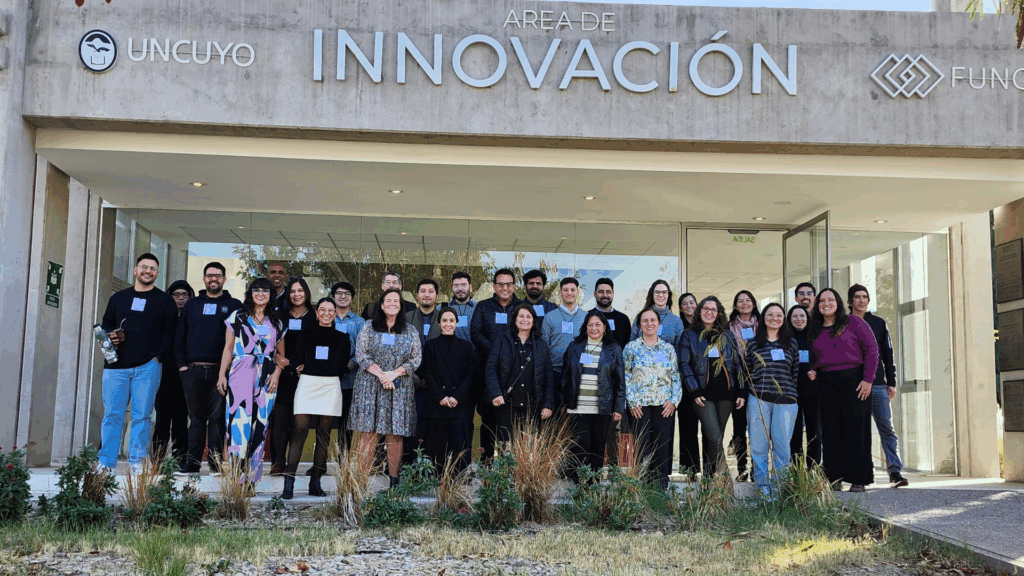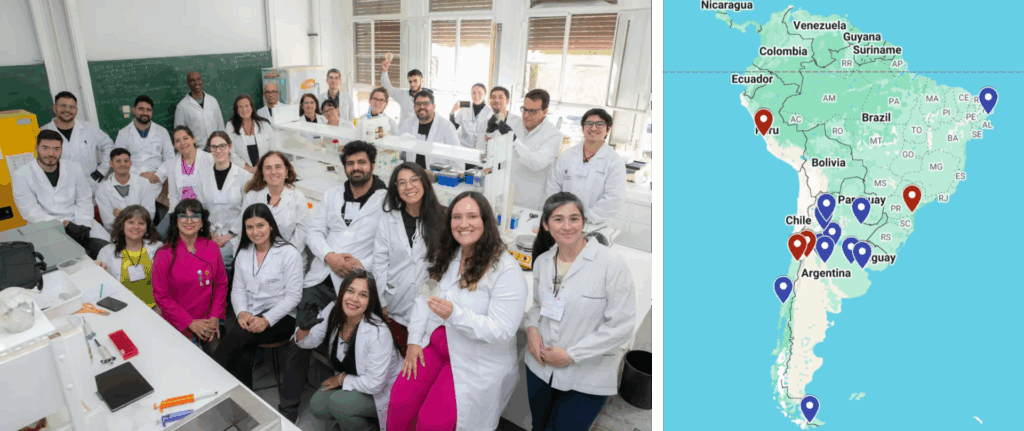From June 2nd to 4th, 2025, Mendoza, Argentina, became the meeting point for biotechnology researchers, students, and innovators from across Latin America. Hosted at the National University of Cuyo (UNCuyo), the Reclone Latin America Workshop brought together 35 participants from five countries to build capacity in local reagent production and strengthen the open science ecosystem in the region.

Why Local Reagent Production Matters
For many researchers across Latin America, access to key molecular biology reagents remains a major bottleneck. High costs, import restrictions, and long delivery times often hinder timely and effective research. The Reclone (Reagent Collaboration Network) initiative seeks to address this challenge by sharing reagents, protocols, and tools – making science more accessible, equitable, and resilient.
Hands-on Learning and Regional Collaboration
The workshop opened with a full day of presentations and discussions, accessible both in-person and online. Sessions covered the vision and progress of the Reclone network globally and in Latin America, highlighting success stories, ongoing challenges, and emerging opportunities. Speakers emphasized the importance of open sharing and community-led science in overcoming barriers to research infrastructure:
- The Rector of the Universidad Nacional de Cuyo, Esther Sánchez, welcomed participants and reaffirmed the university’s commitment to open science and regional collaboration
- Maria Teresa Damiani, Lead of the Reclone Latin American Hub at UNCuyo, introduced the Hub’s role in strengthening local biotechnology capacity
- Jenny Molloy, Reclone Co-Founder from the University of Cambridge, gave an overview of the network’s global mission
- Dario Taraborelli, Program Officer at the Chan Zuckerberg Initiative (CZI), presented CZI’s efforts to support open science worldwide
- Fernan Federici, Reclone Co-Founder and Lead of the Chile Node, shared insights from previous Reclone initiatives across Latin America
- Cibele Zolnier, Latin America Community Manager for Reclone, highlighted community activities, regional events, and opportunities for engagement
- Mariángeles Ávila, Lead of the Mendoza Node, introduced the network’s OpenMTA framework and explained the procedures for requesting reagents, providing practical guidance for participants interested in getting involved
In the afternoon, the workshop featured presentations from participants representing a wide range of universities and research institutions across Latin America. The event featured representatives from several Argentine provinces and regions: Buenos Aires (UNNOBA, UNSAM, and UBA), San Luis (UNSL and UNVIME), Córdoba (UNC), Catamarca (UNCA), Tierra del Fuego (UNTDF), Corrientes (UNNE), Tucumán (INSIBIO), and Mendoza (UNCuyo).
Contributions also came from across the wider region, including the Universidad Peruana Cayetano Heredia (Peru), Pontificia Universidad Católica de Chile and San Sebastián University (Chile), and the Oswaldo Cruz Foundation – Fiocruz (Brazil). These presentations fostered valuable knowledge exchange and showcased both the regional diversity and the shared goals of the Reclone community.

The second and third days of the workshop shifted to fully in-person, hands-on sessions held in the laboratories of UNCuyo. These sessions focused on practical training in the production of key molecular biology reagents, including enzyme expression and purification, protein quantification, and quality control procedures.
The hands-on training was expertly coordinated by a dedicated team from both Argentina and Chile. From UNCuyo, Antonella Losinno, Vanessa Gaona, Milce Vázquez, and Andrea Cappa led the local organization and lab facilitation. From PUC Chile, Severine Cazaux, Valentina Ferrando, and Alejandro Aravena contributed their expertise, guiding participants through essential protocols and troubleshooting strategies. The sessions also created space for open discussions on adapting protocols to local contexts, addressing common technical challenges, and exploring strategies to build a sustainable, decentralized reagent production network across the region.
Looking Ahead
The energy and engagement at the workshop underscored a shared commitment: making biotechnology tools accessible for research, education, and public health across Latin America. Whether through local enzyme production, open-source diagnostics, or capacity-building initiatives, the Reclone network continues to empower scientists to create solutions tailored to their local contexts.
We are deeply grateful to the Chan Zuckerberg Initiative (CZI) for providing the funding that made this workshop possible, enabling us to bring together participants from across Latin America. The event also received valuable support from CYTED, through the work of the Relarus Network within Reclone, further strengthening regional collaboration and advancing our shared mission of making essential research tools more accessible across the continent. Our sincere thanks also go to the Universidad Nacional de Cuyo (UNCuyo) for generously hosting the event and providing access to their laboratory facilities for the hands-on sessions.
Stay connected with Reclone Latin America as this movement grows! Follow us on Instagram and LinkedIn for the latest updates and opportunities to get involved.


